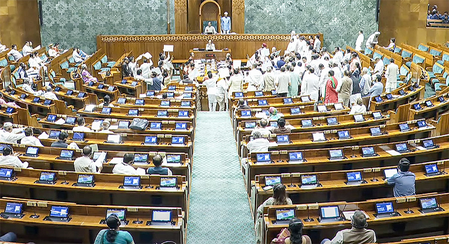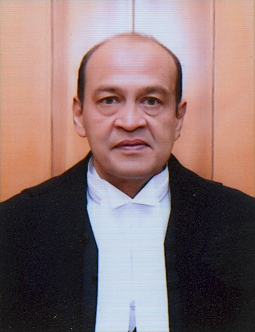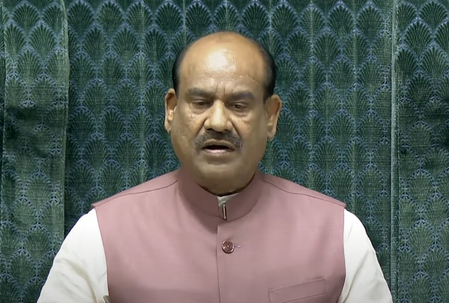
New Delhi, Aug 12 (IANS) The Rajya Sabha on Tuesday passed the National Sports Governance Bill, 2025, and the National Anti-Doping (Amendment) Bill, 2025, marking a watershed moment in India’s legislative efforts to overhaul its sports administration and enhancing chances to win the bid for the Olympic 2036.
The Bills, already cleared by the Lok Sabha, were moved by Union Sports Minister Mansukh Mandaviya, who described them as transformative instruments aimed at promoting ethical governance, athlete welfare, and institutional accountability across the country’s sporting landscape.
The debate in the House was briefly disrupted when Leader of the Opposition Mallikarjun Kharge attempted to raise concerns over the Special Intensive Revision (SIR) of Bihar’s electoral rolls.
Sasmit Patra, who was in the Chair, expunged Kharge’s remarks following an intervention by Leader of the House J.P. Nadda, ruling them unrelated to the legislative business at hand. Subsequently, members of the Opposition staged a walkout.
Among the most poignant interventions came from Olympian P.T. Usha, nominated member and President of the Indian Olympic Association, who recalled her near-podium finish at the 1984 Los Angeles Olympics.
“I missed the bronze by one-hundredth of a second. My heart broke not for myself, but for an entire generation of Indian athletes who had the strength and courage, but not the system,” she said.
“This Bill is not just about governance – it is about justice and fair play.”
Prafull Patel of the NCP (Maharashtra) said, “Every athlete’s voice will now be heard,” adding that the proposed tribunal would ensure speedy resolution of disputes. He noted that the reforms in the Bill would help India realise its Olympic ambitions, including the bid for the 2036 Games.
“Every single sports federation is mired in legal cases. Courts take their own time. This tribunal will change that,” he said, also highlighting the Bill’s mandate for women’s representation in sports federations.
Ayodhya Rama Reddy Alla of the YSR Congress Party welcomed the Bill’s clarity and its promise of a unified framework for national and regional sports federations.
Other members who spoke in support included Dr. Parmar Janswantsinh Salamsinh Jhala of the BJP (Gujarat), Sana Satish Babu of the TDP – who also serves as Secretary of the Andhra Cricket Association – Ravi Chandra Vaddiraju of the BRS (Telangana), Dhananjay Bhimrao Mahadik of the BJP (Maharashtra), Narhari Amin of the BJP (Gujarat), who delivered his remarks in Gujarati, Bhubneshwar Kalita of the BJP (Assam), Seema Dwivedi of the BJP (Uttar Pradesh), and Maya Naroliya of the BJP (Madhya Pradesh).
The House also passed the National Anti-Doping (Amendment) Bill, 2025, which seeks to align India’s anti-doping framework with global standards set by the World Anti-Doping Agency (WADA).
The amendment ensures operational independence for the National Anti-Doping Agency (NADA), addressing earlier concerns over government interference.
It removes oversight powers previously granted to the National Anti-Doping Board, reinforcing NADA’s autonomy in investigations, enforcement, and adjudication.
The Sports Governance Bill seeks to establish a unified legal framework for the development and promotion of sports, rooted in the principles of fair play, transparency, and international best practices.
It aligns with the Olympic and Paralympic Charters and introduces a National Sports Board to regulate and recognise sports federations. The Board will have powers to de-recognise federations for election irregularities, financial opacity, or failure to publish audited accounts.
Crucially, the Bill also provides for the creation of a specialised National Sports Tribunal, chaired by a sitting or former Supreme Court judge, to adjudicate disputes related to athlete selection, governance, and federation elections.
Tribunal decisions will be appealable only in the Supreme Court, offering athletes a faster and more specialised route to justice.
With both Bills now cleared by Parliament, India moves decisively toward building a transparent, accountable, and globally competitive sports ecosystem – one that promises not only medals but dignity, fairness, and institutional support for every athlete.
After Minister Mandaviya’s motion to pass the Bill, Surendra Singh Nagar considered the proposal, and the Bill was passed without any protest from the Opposition, through a voice vote.
–IANS
sktr/dan




